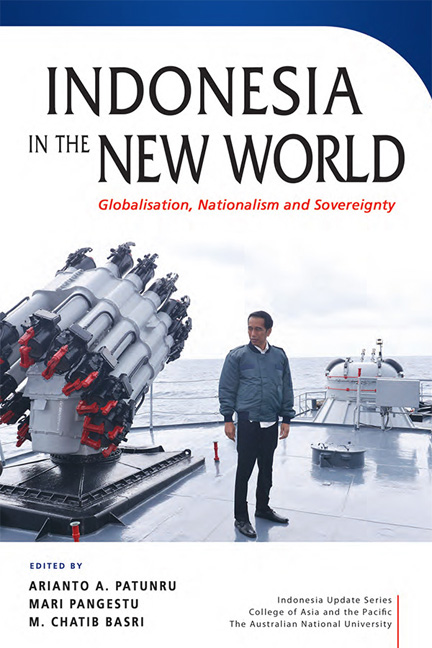Book contents
- Frontmatter
- Contents
- Tables
- Figures
- Contributor
- Acknowledgments
- Glossary
- 1 Challenges for Indonesia in the new world
- PART 1 Globalisation, Nationalism and Sovereignty: the Indonesian Experience
- PART 2 Nationalism in Practice
- PART 3 Impact of and Response to Globalisation
- 8 Anti-globalisation, poverty and inequality in Indonesia
- 9 Gender, labour markets and trade liberalisation in Indonesia
- 10 The good, the bad and the promise of globalisation: a private sector perspective
- PART 4 The Human Face of Globalisation
- PART 5 Navigating The New Globalisation
- Index
- INDONESIA UPDATE SERIES
10 - The good, the bad and the promise of globalisation: a private sector perspective
from PART 3 - Impact of and Response to Globalisation
Published online by Cambridge University Press: 08 June 2019
- Frontmatter
- Contents
- Tables
- Figures
- Contributor
- Acknowledgments
- Glossary
- 1 Challenges for Indonesia in the new world
- PART 1 Globalisation, Nationalism and Sovereignty: the Indonesian Experience
- PART 2 Nationalism in Practice
- PART 3 Impact of and Response to Globalisation
- 8 Anti-globalisation, poverty and inequality in Indonesia
- 9 Gender, labour markets and trade liberalisation in Indonesia
- 10 The good, the bad and the promise of globalisation: a private sector perspective
- PART 4 The Human Face of Globalisation
- PART 5 Navigating The New Globalisation
- Index
- INDONESIA UPDATE SERIES
Summary
This is an observer's attempt to shed some light on the impact of glo¬balisation on Indonesian companies, and on their responses to shifts in trends. I will start by describing the trends in globalisation during the formative years of the Sukarno era (1945–66), then in the development-focused Suharto period (1966–98) and finally during the current period of reformasi (1998–). The Indonesian economy was closed to the world during the Sukarno era but gradually and often reluctantly opened up during the subsequent two periods. Indonesia's globalisation journey has not been a smooth one, with more than its share of fits and starts. The overall direc¬tion, however, has been an unavoidable opening trend.
In the first section of this chapter I will discuss the impact of globalisa¬tion on the corporate landscape, especially the financial sector. During the Sukarno era, the relatively open shutters of the colonial economy began to close with the nationalisation of large Dutch companies. The economy gradually began to reopen during Suharto's New Order era, with the impact varying depending on the sector, the state of development and preparedness to compete of individual companies, and the nature of the government's regulatory oversight. In both the Suharto and reformasi peri¬ods, the most common response of sectors and companies to globalisation was to call for protection, and then to prolong that protection for as long as possible in order to capture domestic market share. This was easier than innovating and improving efficiency to better compete globally.
Even with the country's protectionist bias, however, the disruptive impact of globalisation could not be avoided. Industry players and regula¬tory authorities struggled to adapt to heightened competition and to the rapid changes in technology and business models. Globalisation helped bring about deforestation, pollution and the devastating 1997–98 Asian financial crisis. Local companies have had to cope with rising working, environmental and product quality standards, whether they liked it or not. Government regulatory oversight has become tighter and more com¬plex, raising the cost of corporate compliance. On the other hand, the Indonesian consumer has benefited from having more options and better-quality products.
- Type
- Chapter
- Information
- Indonesia in the New WorldGlobalisation, Nationalism and Sovereignty, pp. 180 - 198Publisher: ISEAS–Yusof Ishak InstitutePrint publication year: 2018

